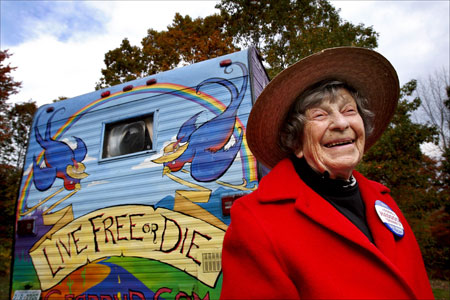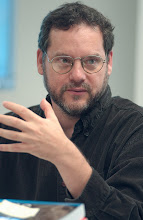Constitution Day Reflections
 As Thomas Jefferson once said, the American Revolution is not really over. It hasn't been won for all time or for all the people in the United States of America. As he also put it, the greatest on-going struggle that still remains at the heart of the American Republic is the struggle between genuine democrats on the one hand who are committed to creating a participatory government of, by, and for the people and, on the other hand, the open or deceitful aristocrats committed to creating a government of, by, and for wealthy and powerful elites.
As Thomas Jefferson once said, the American Revolution is not really over. It hasn't been won for all time or for all the people in the United States of America. As he also put it, the greatest on-going struggle that still remains at the heart of the American Republic is the struggle between genuine democrats on the one hand who are committed to creating a participatory government of, by, and for the people and, on the other hand, the open or deceitful aristocrats committed to creating a government of, by, and for wealthy and powerful elites. I don't know about you, but I believe that the vision of a fair, frugal, democratic, and peaceable republic is still the best part of what some have called the American civil religion. In the American history that I was taught in grade school, this democratic vision was associated with the Boston Tea Party, the Declaration of Independence, the Revolutionary War, and, for many, the second US Constitution which was proposed 221 years ago to this day. Both the Declaration and the Constitution are considered the sacred texts of America's democratic civil religion. Interestingly, many populists and progressives, along with liberals and right-wingers all sing uncritcal praises of the Constitution.
Yet, I think it is a bit more complicated than this. In fact, I think it is important to look much more deeply at both the underlying attitudes of the Constitutional framers and the document itself--which actually has a much different spirit than the much more democratic orientation of the Declaration of Independence. We should remember, too, that there was a huge democratic opposition at the time against the many aristocratic features of the newly proposed US Constitution, which ultimately replaced the Articles of Confederation, the first and somewhat more democratic constitution of the United States of America.
Indeed, what most people say they appreciate most about our nation's second Constitution is the Bill of Rights, the ten amendments of the Constitution that were not put into the Constitution by the majority of the framers, and were actually only accepted by them when they realized that the core aristocratic features of the governmental structure that they wanted to impose on the relatively new federation of American states would be impossible to get ratified without the inclusion of a Bill of Rights. They did, however, manage to keep out of the Bill of Rights two of Jefferson's proposed Constitutional amendments--to outlaw a standing army in time of peace and ban all corporate monopolies. This would have gone too far in the eyes of the remarkably aristocratic framers.
Also, we should remember that when the second Constitutional framers met in Philadelphia their only legal charge from the US Continental Congress was to generate amendments to the Articles of Confederation that would need to be ratified by all of the states in the Confederation. Instead, they went well beyond their legal charge and crafted an entirely different Constitution for an entirely different governmental structure that they said would only require the ratification of nine states to go into effect. Interestingly, most of the framers were also among the wealthiest and most powerful business elites and slave owners in the new country. As James Madison ultimately reported, they even entertained the notion of creating a new American monarchy with George Washington as King, but decided against this because they believed that this would lead to massive, popular rebellion. Given this, they understandably held all their deliberations behind closed doors that were posted with armed guards, and the notes of their discussions were kept secret for over 50 years.
It is pretty eye-opening to see what they actually said behind closed doors. Here is just a sampling--taken from Jerry Fresia's Toward an American Revolution: Exposing the Constitutions and Other Illusions:
Alexander Hamilton of New York
All communities divide themselves into the few and the many. The first are the rich and well born, the other the mass of the people. The voice of the people has been said to be the voice of God; and however generally this maxim has been quoted and believed, it is not true in fact. The people are turbulent and changing; they seldom judge or determine right. Give therefore to the first class a distinct, permanent share in the government. They will check the unsteadiness of the Second... Nothing but a permanent body can check the imprudence of democracy... It is admitted that you cannot have a good executive upon a democratic plan... The people, sir, are a great beast.
George Washington of Virginia
We have probably had too good an opinion of human nature in forming our confederation. Experience has taught us that men will not adopt and carry into execution measures the best calculated for their own good, without the intervention of a coercive power... The tumultuous populace of large cities are ever to be dreaded. Their indiscriminate violence prostates for the time all public authority.
James Madison of Virginia
In England, at this day, if elections were open to all classes of people, the property of landed proprietors would be insecure. An agrarian law would take place. If these observations be just, our government ought to secure the permanent interests of the country against innovation. Landholders ought to have a share in the government, to support these invaluable interests, and balance and check the other. They ought to be so constituted as to protect the minority of the opulent against the majority.
Elbridge Gerry of Massachusetts
The evils we experience follow from the excess of democracy.
John Dickinson of Delaware
Beware the dangerous influence of those multitudes without property & without principle.
John Adams of Massachusetts
Men in general... who are wholly destitute of property, are too little acquainted with public affairs to form a right judgment, and too dependent on other men to have a will of their own.
George Clymer of Pennsylvania
A representative of the people is appointed to think for and not with his constituents.
John Francis Mercer of Maryland
The people cannot know and judge the characters of candidates. The worst possible choice will be made.
Governor Morris of Pennsylvania
There never was, nor ever will be a civilized Society without an Aristocracy.
Charles Pinckney of South Carolina
Are you not abundantly impressed that the theoretical nonsense of an election of Congress by the people in the first instance is clearly and practically wrong? [I am] for stiff measures to restrain the urges of arrant democracy.
Edmund Randolph of Virginia
We should fear the turbulence and follies of democracy.
Roger Sherman of Connecticut
The people immediately should have as little to do as may be about the government.
John Jay, who became the first Chief Justice of the Supreme Court under the new Constitution
The people who own the country ought to govern it.
I know that progressives like Ralph Nader and Dennis Kucinich like to carry a copy of the Constitution in their pockets and moderate liberals like Barack Obama describe the Constitution as a beacon of democracy in the rosiest of terms, but is it as simple and tidy as they would have us believe?
I think part of the problems that we face today are caused by the fact that the federal government now routinely violates the best, most democratic features of the Constitution--which were almost all driven into the Constitution by democratic social movements of ordinary people. Yet, I also think that a core part of the many problems we face today--of increasingly elite rule, corporate domination of government and media, and the immense power of the military-industrial complex--are actually rooted in some of the worst, most aristocratic features that were embedded, and still remain, in the Constitution, or in the Supreme Court's questionable interpretation of it, such as the bizzare legal doctrine of "corporate personhood."
Isn't it time for a more nuanced, critical, and balanced view of the Constitution?


